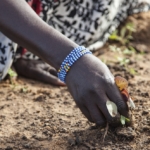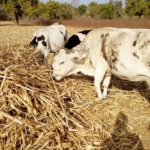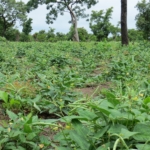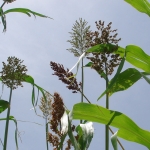


Wageningen University
AMEDD, IER
Mali
5/2016—5/2019
In the cotton zone of southern Mali, agroecological intensification (AEI) is a promising way to increase agricultural productivity and nutritious food production while maintaining healthy ecosystems and equitably improving livelihoods. In the study sites for this project, the team diagnosed as major bottlenecks to AEI high risk, poor market linkages, and limited access to seed, together with poor farmer capacity in farm planning and budgeting. In the project’s first phase, the team developed an approach based on participatory on-farm trials and modeling to narrow a large range of options to more specific baskets of solutions that are relevant and promising for specific farm types and contexts. However, knowledge gaps around nutrition and environmental indicators and underdeveloped trade-off approaches still impede a thorough understanding of multi-scale impacts in the various AEI domains. Furthermore, effective policymaking and development efforts in the region are hampered by a lack of information on AEI pathways and the enabling policy and institutional conditions. A modeling framework for exploring the solution space of entire farm populations will help elicit these AEI pathways in stakeholder consultations. In co-learning processes, effective communication among various stakeholders is essential, but appropriate tools and approaches are not well documented. With the farmer monitoring and evaluation networks, value chain interactions, stakeholder platforms, and AEI pathway workshops, this project will be a useful laboratory for experimenting with communication products, tools, and approaches, which will be refined based on feedback.
This project aims to strengthen AEI research as a priority theme for the CCRP in West Africa. Participatory, place-based, and adaptive farming systems analysis is well positioned to identify AEI options tailored to the multidimensional and multi-scale context in which farmers operate. Building on its first phase, this project aligns well with the CCRP by 1) identifying and assessing solutions that improve the performance of agricultural systems, and 2) building the capacity of institutions and stakeholder groups to support farming communities to advance along AEI pathways. Through an adaptive co-learning process with a focus on gender inclusiveness, multidirectional information exchange, and joint decision-making, the project aims to empower smallholder farmers to drive the development process and benefit from contextualized agricultural research. This project intends to produce tailored AEI solutions, knowledge, tools, approaches, and communication products. To achieve its objectives and outcomes, the project will use a farming systems analysis (FSA) approach, gradually scaling up to a food systems approach through local value chains and attention for nutrition-related activities. The research is embedded in stakeholder-researcher exchange networks for which communication tools and approaches will be refined. The FSA relies on a combination of on-farm experiments, modeling, and multiple stakeholder engagement to identify baskets of AEI solutions. Performance indicators such as agricultural productivity, income, and food self-sufficiency will be complemented with information on nutrition, labor requirements, resilience, and risk, all of which will be gender-disaggregated.
Envisaged outputs can be categorized as tailored AEI solutions, knowledge, tools, approaches, and communication products. Specifically, the project seeks to:
By using these outputs in the co-learning process, the team aims to foster outcomes in terms of improvements in knowledge, skills, and attitudes of various stakeholders. In the long term, these outcomes will contribute to positive impacts on:




